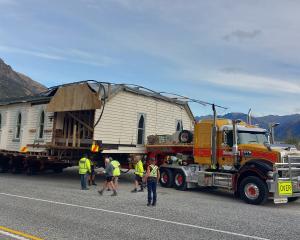Rumours of water being taken illegally are surfacing in Otago as farmers face increasing pressure from the continuing dry weather and resulting irrigation restrictions.
Otago regional councillors from the affected areas yesterday warned of the coming ''perfect storm'' and the potential for ''frightening'' outcomes. So far, the Taieri River and North Otago catchments have been the hardest hit by dry conditions similar to those seen in 1999.
The Taieri River at Canadian Flat had dropped from 1087 litres per second a week ago to about 600 litres per second yesterday, close to the lowest flow, recorded in 1999, of 473 litres per second.
As a result, the Otago Regional Council restricted irrigation from the Taieri River last week.
Cr Graeme Bell, of the Dunstan constituency, said at a meeting of the council's technical committee yesterday the accusations of water theft highlighted the atmosphere that was developing in some parts of the region.
Council chief executive Peter Bodeker said it was investigating five complaints concerning water takes but could not comment further while they were under investigation.
Staff were also monitoring all rivers through the council's own telemetry and data received from water takes as well as observations while out in the field undertaking gauging and water quality sampling.
''Specific observation inspections are currently only being carried out in the Taieri and Pomahaka catchments, as that is where restrictions apply.''
As more waterways came under stress, further inspection programmes were being developed, Mr Bodeker said.
Cr Gretchen Robertson, of Dunedin, said some farmers were under considerable emotional and commercial stress and the council needed to be mindful of that.
''The best and worst traits come out in people in times like this.''
If the situation continued and the council had to ''cut off'' more irrigation takes, it was important it was monitoring everyone to ensure people were acting fairly.
Wondering what your neighbour was doing was the ''worst thing'' and could affect catchment relations for decades to come, she said. Cr Doug Brown, of the Moeraki constituency, said that without significant rainfall soon, the situation was developing into the ''perfect storm''.
''There is a serious situation developing. There has been a lot of land use change since the last comparable drought.''
That meant there was a lot more demand for water, meaning more people were under stress, he said. Cr Gary Kelliher, of the Dunstan constituency, said that since the last dry period, farmers had improved their use of water, which meant there was less run off into rivers to bolster their flows in dry periods.
It also meant farmers who had made the efficiency changes were under huge financial stress. So it was a new situation for many farmers to deal with, he said.
''It's a learning period. I agree it could be the perfect storm with very frightening potential outcomes. If we don't get substantial rainfall soon, farms will be going into winter with very little feed.''
Council chairman Stephen Woodhead said although rain was predicted for this weekend, the amounts expected would give only minor relief.
''It'll only wet the top couple of inches of soil. Maybe give a week of relief.''
Cr David Shepherd, a former chairman of the Otago Rural Support Trust, said there was support for farmers from the trust and farm advisers, which farmers needed to take advantage of.
Having the Ministry for Primary Industries declare an adverse event was not an answer, nor would it put money in farmers' pockets, he said.
''There are limits to what MPI can do.''
After yesterday's meeting, councillors attended a private workshop to be updated by staff on the situation and any potential action needed.












